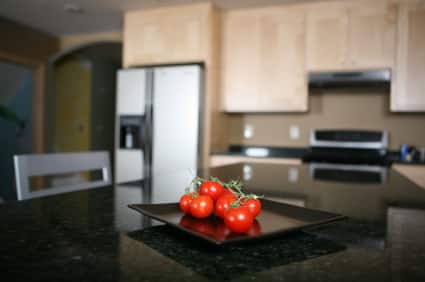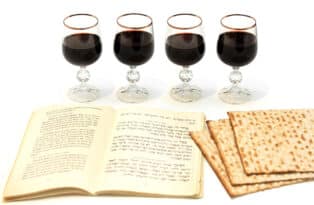In recent years, an array of choices of kitchen counters (collectively known as shayish) have become available in Israel, from granite, wood, engineered stone to glass. The majority of products are brands imported from major companies around the world, while some products are ‘home-grown”or manufactured in Israel.
The types of countertops available for kitchen and bathroom tops, can be divided into six main groups which are granite, engineered stone, synthetic, wood, stainless steel and glass countertop products.
Granite Countertops
Granite is a quarried rock which in its natural appearance has a medium to coarse-grained texture and comes mostly in medium to dark colors with a polished surface. In Israel, granite is imported mainly from Italy and South America.
- Pros: durable; beautiful complexion; least absorptive of countertop products; easy to kasher for Pesach.
- Cons: surface can have streaks of color and veining, differences in range of color and tone between pieces; proper sealing necessary to prevent staining; over time cracks can appear if it isn’t being coated with a sealer every few years; among the more expensive options.
Engineered Stone Countertops
One of the most popular used countertops is made of what is technically known as engineered quartz, which is composed of approximately 93 percent quartz particles. Quartz countertops are often referred to as the worry-free alternative to granite, which needs some care and maintenance since it is natural stone. Quartz countertops do not require annual resealing, are highly resistant to scratches and stains, and come in a big variety of colors. The most used countertop product in Israel is Caesarstone with an estimated market share of 90 percent. Caesarstone’s engineered stone, which has become a world-known pioneer in quartz-based products, is a material made in Israel at a production line owned by Kibbutz Sdot-Yam.
Silestone, which is produced by Spanish company Cosentino and imported to Israel, is a direct competitor to Caesarstone. They are two different brands which technically offer pretty much the same product but may differ in the variety of color selection available. The added feature with the Silestone product is that it also has anti-microbial properties.
- Pros: hard, non-porous surfaces require no sealing, virtually maintenance-free, almost resistant to stains and scratches.
- Cons: rapid temperature changes can damage surface; usage of strong chemicals, solvents, or highly aggressive cleaning products with high alkaline/pH levels (pH 8.5 or higher) can damage its physical properties; direct use of sharp objects can cause scratches.
Synthetic countertops
Among the synthetic countertop product brands, Corian is considered the elite of the elite. Corian countertops are made from an acrylic polymer-based material. Corian is a product of the DuPont group. In Israel, it is imported by the Nyga Group, which has offices & warehouses in Netanya and Tel-Aviv, a main showroom in Tel-Aviv, a showroom, warehouse and fabrication & service center near Netanya, a service center in Eilat and a manufacturing plant in Carmiel.
- Pros: hard; non-porous surface; no sealing; seamless sinks; uniform look; large range of colors.
- Cons: prone to scratches by metal objects; heat damage by direct heat exposure; expensive.
Wood/Butcher Block Countertops
Wood countertops are available in a variety of colors and finishes and create a warm look in the kitchen. However, they are not as popular as stone or synthetic countertops since they require high maintenance and are not as durable.
- Pros: functional; easy to clean; large cutting surface; natural anti-bacterial material; inexpensive.
- Cons: regular maintenance; porous, not heat-proof and water-proof; prone to stains; need for professional surface resealing and oiling.
Stainless Steel Countertops
Stainless steel countertops are a popular option for the design of a modern, high-techy kitchen with a sleeky and simple look.
- Pros: modern; durable; heat and water-resistant; hygienic, resists bacterial growth.
- Cons: prone to scratch or dent over time; easily smudged by wandering hands, finger prints; expensive.
Glass Countertops
Glass countertops are the less common choice for the kitchen but they are becoming more popular among more design-conscious homeowners.
- Pros: clean, stylish look; non-porous; sanitary; heat tolerant; stain resistant.
- Cons: not very practical, in particular in family homes with children since the material leaves finger, hand prints, water spots; very delicate, scratches easily; expensive.
Over the past 15 years, engineered stone and synthetic countertops have very much become the most popular choice in kitchens in Israel since they are significantly dense and durable, fairly easy to maintain and have a unified aesthetic look.
While the choice of countertop type depends very much on one’s personal needs, preferences, and budget, the correct selection of color, thickness (kunt) and edge detail of the countertop are also important issues to be considered. As always, it is recommended to hire an experienced interior designer who can provide professional and practical advice.
It is also very important to know who is doing the fabrication and installation of the kitchen countertops. It is advisable to ask to see work samples in a showroom or stockyard and/or get references. Once the countertops are selected, exact measurements of the lower cabinets, will need to be taken by representatives of the ordered product, in order to ensure a precise installation and a clean finish.


